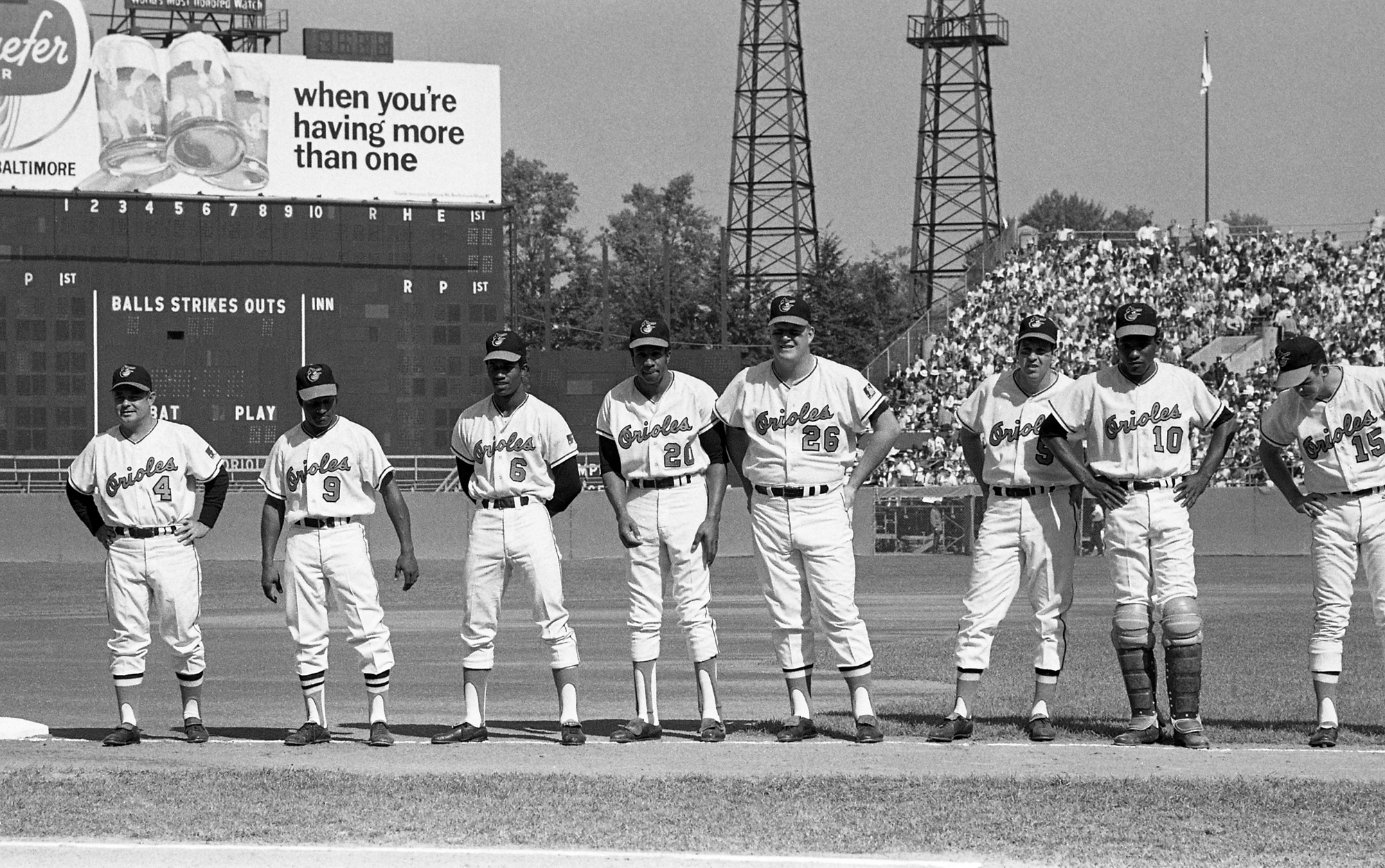
1969 AMERICAN LEAGUE CHAMPION BALTIMORE ORIOLES

Great season ends on the wrong end of a Miracle
by Rick Benson
Though Baltimore has enjoyed world championship glory a few times over the years, some of their best teams had their seasons end in agonizing disappointment. The Bullets knocked off their arch rivals, the New York Knicks in a thrilling seven game series that came down to the final seconds before experiencing first-hand how great Lew Alcindor (later known as Kareem Abdul-Jabbar) really was. And let’s not mention how the 13-1 Colts buzzed through the 1968 season before making Joe Namath a household name.
Many could argue that the 1969 Orioles were the city’s finest baseball team ever. Manager Earl Weaver was establishing himself as one of the game’s top managers and the talent he had was coming together in a way that was drawing national attention. 1969 was the year that baseball split both leagues into two, six team divisions to accommodate a total of four expansion teams. The concern about a drop off in overall talent was overshadowed by the prospect of additional pennant races with the divisional format that would result in a best-of-five series between the division winners to determine who would advance to the World Series.

This team could have gone down as one of the greatest ever, but their legacy instead just added to the legend of the Miracle Mets, who pulled off one of the biggest World Series upsets ever by beating the Orioles. Baltimore outscored its opponents 779-517 in the regular season. The Detroit Tigers won 90 games and finished 19 games out in the first season of divisional play; thus stifling any possible pennant race euphoria; at least in the American League East as the Orioles won the first-ever American League East title, finishing first with a record of 109 wins and 53 losses.
The first ever ALCS was anti-climactic as well as the Birds swept the Minnesota Twins and seemed more than ready and able to end the improbable run of the National League champion New York Mets. In their seven previous seasons, the Mets had never finished higher than ninth place in the ten-team National League and had never had a winning season. In fact, they lost at least one hundred games in five of those seasons. However in major league baseball's 100th season, they overcame mid-season difficulties while the division leaders for much of the season, the Chicago Cubs, suffered a late-season collapse which added to their long storied history of futility that continued to their 2016 World Series win. The Mets finished 100–62, eight games ahead of the Cubs. The Mets went on to defeat the National League West champion Atlanta Braves three games to none in the inaugural National League Championship Series; setting up their showdown with the heavily favored Orioles.
Rather than dwell on the 1969 World Series (we all know how that turned out), let’s focus on the great team that the Orioles were becoming. Weaver and his coaching staff were all products of Baltimore’s farm system—either as players, coaches or both and were all well-groomed in what became known as the “Oriole Way”. Pitching, defense and a borderline obsession with fundamentals translated into on-field success; along with the always welcome three-run home run.
Mike Cuellar, a very talented and mercurial left-hander who Weaver said he gave more chances to than his ex-wife, led the Orioles pitching staff with a 23-11 record and a 2.38 ERA and was co-winner of the Cy Young award with Detroit’s Denny McClain. Fellow lefty Dave McNally also hit the 20-win mark, going 20-7 with a 3.22 ERA while righty Jim Palmer led the starters with a 2.34 ERA while logging an equally impressive 16-4 mark.
First baseman Boog Powell (.304, 37 HR, 121 RBI), right fielder Frank Robinson (.308, 32 HR, 100 RBI) and centerfielder Paul Blair (.285, 26 HR, 76 RBI, 20 SB) were the top hitters in 1969. Blair and the rest of the Baltimore infield--third baseman Brooks Robinson, shortstop Mark Belanger and second baseman Davey Johnson—brought home Gold Glove awards. Powell and Frank Robinson were voted in as starters in the All-Star game and were joined on the American League squad by Blair, McNally, Johnson and Brooks Robinson.
“Wait ‘till next year” is the typical battle cry for teams that fall short of their goals. But for the 1969 Baltimore Orioles, next year would be the season that made the Big Red Machine turn blue and introduce the world to the vacuum cleaner wearing number five.





